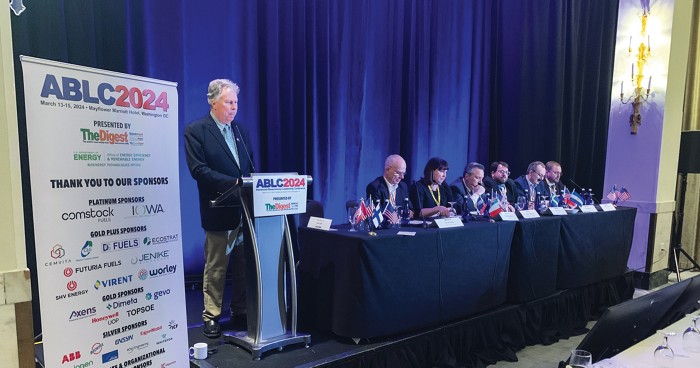Advertisement
Grab your lab coat. Let's get started
Welcome!
Welcome!
Create an account below to get 6 C&EN articles per month, receive newsletters and more - all free.
It seems this is your first time logging in online. Please enter the following information to continue.
As an ACS member you automatically get access to this site. All we need is few more details to create your reading experience.
Not you? Sign in with a different account.
Not you? Sign in with a different account.
ERROR 1
ERROR 1
ERROR 2
ERROR 2
ERROR 2
ERROR 2
ERROR 2
Password and Confirm password must match.
If you have an ACS member number, please enter it here so we can link this account to your membership. (optional)
ERROR 2
ACS values your privacy. By submitting your information, you are gaining access to C&EN and subscribing to our weekly newsletter. We use the information you provide to make your reading experience better, and we will never sell your data to third party members.
Biofuels
Oil majors back out of biofuel in Europe
Chevron furloughs workers in Germany after similar moves by BP and Shell
by Craig Bettenhausen
July 11, 2024
| A version of this story appeared in
Volume 102, Issue 21

The European biofuel industry suffered three major disappointments in quick succession over the past month. Chevron is furloughing workers at its biodiesel plant in Oeding, Germany. The move comes after BP scaled back expansion plans for sustainable aviation fuel and renewable diesel in Europe and Shell halted construction on a big biofuel plant in Rotterdam, the Netherlands.
Chevron’s furloughs are an ominous sign for the plant. The oil company idled the plant a few months ago, which industry watchers saw as a stopgap answer to low selling prices for biofuels. The firm is now telling workers to stay home starting Aug. 1 and enrolling them in government social safety net programs. “I don’t think it would be a surprise if later this year they completely pull the plug,” says Bogdan Avramuta, an analyst at the consulting firm Rethink Research.
Matthew Stone, managing director of the market research firm Prima Markets, says Shell’s decision to stop building is the most significant, in part because the Rotterdam facility would have been one of Europe’s biggest biofuel plants. On July 5, the firm told shareholders it will write off a loss of up to $1 billion on the site, a move that makes starting it up again more difficult and less likely, Stone says.
European Union biofuel prices have been depressed since late 2022, Stone says, when inexpensive biodiesel imports from China started flooding the market. In an interview with Bloomberg News, Chevron explicitly blamed the plant’s closure on unfair trade practices by Chinese companies.
Biodiesel is made from natural fats and oils through a reaction with methanol and potassium hydroxide or sodium hydroxide. The result is fatty acid methyl esters that can burn in a diesel engine.
European regulators have been investigating fraud cases in which imports are intentionally mislabeled to maximize their value, Stone says, a practice called circumvention. For example, diesel made from used cooking oil is worth more than diesel made from virgin palm oil because EU rules say used cooking oil is a more sustainable feedstock.
Prosecutors made some progress on individual fraud cases, Stone says. But in May, the emphasis for EU trade authorities shifted to a more systemic problem, dumping, a practice in which exporters sell at artificially low prices to drive competitors in the importing country out of business.
In an open letter to the European Commission (EC) dated June 6, the European Biodiesel Board accuses China of a biofuel dumping scheme coordinated by the central government. “The EU must be extremely firm against the Chinese governmental strategy to destroy the EU’s industrial base in renewable energies,” the letter says.
In response to those allegations, the EC announced in late June that it will impose provisional import duties on Chinese biodiesel starting on Aug. 16. Stone says those duties will likely become long-term tariffs, similar to the antidumping duties the EU has imposed on biodiesel from the US since 2008.
Tariffs and other import fees levied broadly on Chinese biofuel imports are “a slippery slope to protectionism,” according to the Chinese biodiesel producer Longyan Zhuoyue New Energy. They foster a trade environment that would “prioritize individual interests over collaborative efforts for global sustainability,” the firm says in a letter it sent the EC.
Noor van Asseldonk Chen, a spokesperson for Longyan Zhuoyue, says high feedstock costs are what’s scaring oil majors away from European biofuel projects, not competition from cheap imports.
In a recent hearing, Longyan Zhuoyue urged the EC to support its domestic biofuel industry with financing instead of suppressing imports with punitive economic measures. In supporting documents from the hearing, the firm says, “While the anti-dumping investigation may be a short-term trade remedy in the interest of European biodiesel producers, we believe that this will ultimately hinder broader, long-term sustainability interests of the European Union.”




Join the conversation
Contact the reporter
Submit a Letter to the Editor for publication
Engage with us on Twitter